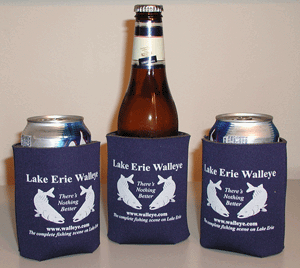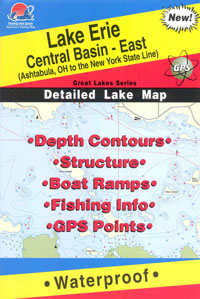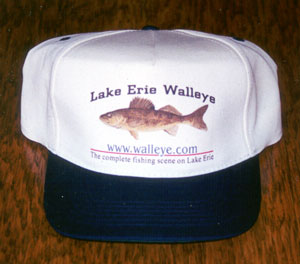Of Minnows and Men
by Ron Anlauf
Live bait definitely has it’s time and place when it comes to
walleye fishing, and
 so
it goes for specific types of bait. A good rule of thumb includes using
minnows early in the season and again in the fall, during periods of
colder water. Leeches come on strong as things warm up a bit, followed
by night crawlers which are a good choice for nailing walleyes all
summer long. As with most rules of thumb there are exceptions and the
live bait rule has a big one; minnows can produce all summer long. Not
just any minnow though, and not just any situation.
so
it goes for specific types of bait. A good rule of thumb includes using
minnows early in the season and again in the fall, during periods of
colder water. Leeches come on strong as things warm up a bit, followed
by night crawlers which are a good choice for nailing walleyes all
summer long. As with most rules of thumb there are exceptions and the
live bait rule has a big one; minnows can produce all summer long. Not
just any minnow though, and not just any situation.
Under the right conditions minnows can be the hottest thing going,
even when they’re not supposed to be. According to Team Crestliner
member and full time guide Richie Boggs of Nisswa, Minnesota: “I’ll use
minnows all summer long, and do it with total confidence. When just
about everyone else has given up on minnows I‘ll keep using them and
keep catching fish.”
The fact is walleyes never quit eating minnows and baitfish even
during the heat of summer, as they make up the lion’s share of a
walleye’s natural diet. Anglers that have gone their own way and stuck
it out with minnows have found they can catch fish, including some of
the largest a system has to offer. Larger fish are typically more
difficult to fool, and the natural attraction of a lively minnow may be
too much to resist.
As previously mentioned there are preferred minnow types for using
all season long which includes the chub family like rainbows,
leatherbacks, redtails and creek chubs. They make up the most sought
after and most effective of the species. Richie Boggs will use redtails
anytime he can get them, and feels they’re worth the extra money. “My
bait bill runs close to $2,000 for an entire season, but it’s money well
spent. In the Brainerd area most of my walleyes are caught along the
weed line, and our lakes are loaded with bluegills which will constantly
pick on leeches and tear up crawlers. Put down a redtail and the panfish
will leave it alone. Walleyes on the other hand can‘t seem to help
themselves. Pike and big largemouth will also take a red tail which
helps to keep the clients happy.” Richie runs red tails on live bait
rigs like the Northland Roach Rig, and will use a quarter ounce sinker
and a two or three foot leader and a #2 hook.
“The shorter snell helps to keep the bait from getting tangled up
with weeds and makes it easier to work a minnow through the green stuff.
I also like to tail hook a minnow if I have the fish cornered and will
move super slow or hover right over the top of them. By hooking them
through the tail they’ll swim and thrash and turn fish on.”
Team Crestliner member and professional fisherman Rick Olson of Mina,
South Dakota will use creek chubs to nail deep running reservoir
walleyes during the heat of the summer. “When fish set up on deeper
points or humps a creek chub on a live bait rig can be deadly. They can
be a real pain to find and are tough to keep alive but can be worth
their weight in gold, especially if there’s big money on the line.”
Rick doesn’t use the standard live bait rig though, and is more
likely to employ a lighter bottom bouncer combined with a plain hook on
a long snell which can run up to six feet or more; “The longer snell
gives the chub more room to roam and lets it act more naturally. It also
helps to give fish more time to completely take a minnow before they
feel the weight of a bouncer and spit the bait.”
As previously mentioned keeping minnows alive during the heat of the
summer can be a tough job and requires some special care and equipment.
For starters you have to keep your bait well oxygenated, especially when
dealing with the warmer water temps of summer. Crestliner’s Tournament
Series boats have a special Aqua Innovations oxygenator built in that
helps to keep a live well full of fish alive, as well as bunch of
expensive minnows. The Aqua Innovations oxygenator actually separates
the water molecule which releases oxygen into the system, and hydrogen
that dissipates on the surface. And it does it without heating the water
which is a killing factor when it comes to trying to keep fish and bait
alive.
If you’re going to try and keep minnows alive for any length of time
you’re going to have to keep them cool, but not cold. A mistake that
first timers often make is icing down oxygenated air bags filled with
minnows, which almost always kills them. The key is keeping them cool,
and not any colder than the water they’ve been held in. That means
coolers and a little ice added at specific intervals. You can cool
minnows down further but you have to take your time and let them adjust
to the changes. Anything less and you’ll send them into shock and all
you’ll have left is a bunch of expensive but very dead minnows.
Even with the extra effort it takes to keep minnows alive obviously
Richie and Rick believe they’re worth it. If creek chubs or red tails
can mean extra fish at the end of the day how far would you go? See you
on the water.





 so
it goes for specific types of bait. A good rule of thumb includes using
minnows early in the season and again in the fall, during periods of
colder water. Leeches come on strong as things warm up a bit, followed
by night crawlers which are a good choice for nailing walleyes all
summer long. As with most rules of thumb there are exceptions and the
live bait rule has a big one; minnows can produce all summer long. Not
just any minnow though, and not just any situation.
so
it goes for specific types of bait. A good rule of thumb includes using
minnows early in the season and again in the fall, during periods of
colder water. Leeches come on strong as things warm up a bit, followed
by night crawlers which are a good choice for nailing walleyes all
summer long. As with most rules of thumb there are exceptions and the
live bait rule has a big one; minnows can produce all summer long. Not
just any minnow though, and not just any situation.